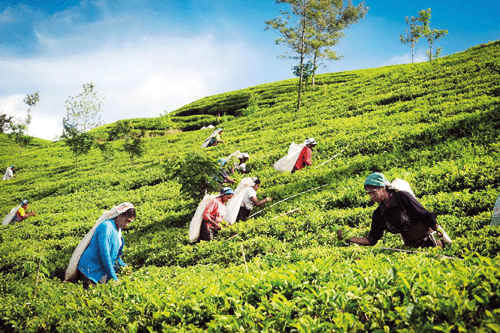‘Packed in Ceylon’ tag for blended Ceylon teas on the cards

File pic of tea pluckers.
The Government is expected to introduce a number of measures to ensure the regional plantation companies (RPCs) in the tea sector would increase their income levels and production capacities in addition to opening the doors to tea blending.
A re-introduction of the fertiliser subsidy for the RPCs is being worked out by Plantations Minister Navin Dissanayake who is positive of regaining this facility in the next budget. He made these observations during an interview with the Business Times at the Ministry office at Battaramulla on Thursday.
Noting that tea is particularly hit and that is the reason why they would be looked at favourably in this regard, he also said that they were trying to establish a “piecemeal approach” in bringing back glyphosate, the weedicide for the tea plantations.
Minister Dissanayake believes his approach would work and stated that the existing ban on the use of glyphosate on agricultural lands could be lifted solely for the use on commercial tea plantations for a period of three years until the industry is ready to turn to organic weedicide.
Moreover, a state- appointed committee is studying the lease agreement between the RPCs and the government with the likelihood of offering a more flexible deal in future.
Stringent monitoring mechanisms would be adopted in future by the Sri Lanka Tea Board (SLTB) to ensure good tea quality.
In addition, lands currently used for supplementary crops can also be used for palm oil production within the existing regulatory framework, the minister said.
He noted that exerting pressure and regulation on the plantation companies was not a good move and added that there is no red light on palm oil production. Responding to environmental concerns the minister said “I don’t go by weird environmentalists”, adding that “there is no hard evidence” to prove it could amount to soil erosion.
In this respect, the state has obtained the services of an agricultural specialist and financial specialist to address these issues and obtain a snapshot of the companies respectively.
Blending Ceylon Tea
With a committee established recently to study the proposals for tea blending in Sri Lanka, the government has already received offers from two international tea packaging firms with British labels with each investing US$70 million for packing teas for export, the minister said.
Minister Dissanayake described this as “an investment that should not be missed” and an “opportunity for Sri Lanka.”
Discussions are underway to shift the operations of tea blending by these firms currently carried out in other countries to Colombo, the minister said.
He pointed out that the government would ensure these firms could be established within the Board of Investment (BOI) zones with the ability to purchase a certain amount of locally produced teas from the Colombo auctions that would be later packaged and exported as ‘Packed in Ceylon’.
Meanwhile, commenting on the plight of the tea pluckers and estate workers, the Minister noted “we have to really give some social dignity to the estate plucker”.
With more recognition they should be equipped with more skills. While there is no glamour in this job the only assurance they have is that unlike other labourers these workers are guaranteed 25 days of work per month, Minister Dissanayake said.
Promoting Ceylon Tea
Tenders are currently being called for the selection of an international agency to carry out media buying, which is obtaining the content to advertise in the international media.
Since the SLTB does not have the necessary capacity to deal with this kind of work it was thought best to select an external agency to commence the tea promotion campaign in December this year, the minister said.
The first television advertisement had been worked out by the advertising agency appointed in this regard at a cost of US$700,000 which was released in June to a targeted audience in the US as a pilot project.
No arrears, talks on new model begin in 2017
Plantations Minister Navin Dissanayake on Thursday told the Business Times that the government would not agree to pay any arrears on the wages to the plantation workers as agreed by the companies and the trade unions.
He noted, “this cannot be done” and asserted it was mentioned during the negotiations that the arrears of the wages agreed upon last week will not be paid to the workers. The Collective Agreement entered between the trade unions and the RPCs had taken over a year to finalise when it should have been concluded in April 2015.
The minister pointed out that as agreed in the recently signed Collective Agreement the trade unions, the RPCs and the government would be sitting down to begin discussions on the new outgrower model, a clear departure from the present ages-old structure on the plantations that had been established by the British colonials who started tea growing in the country.


